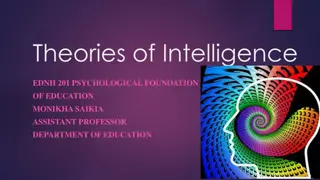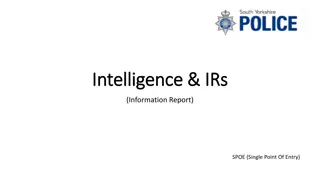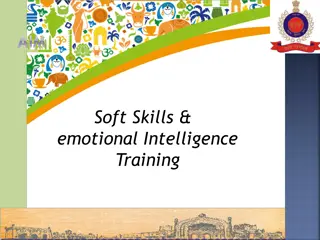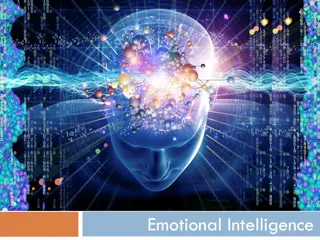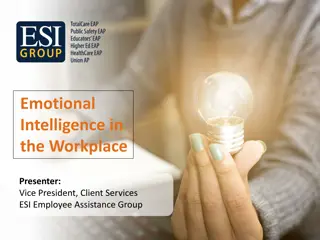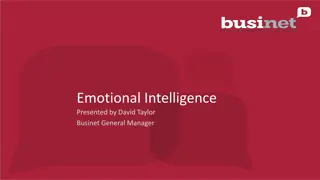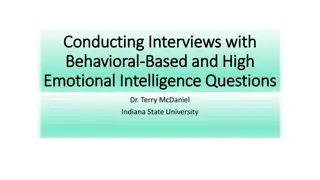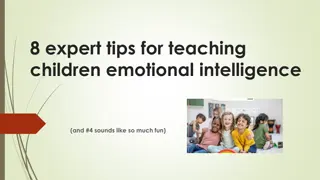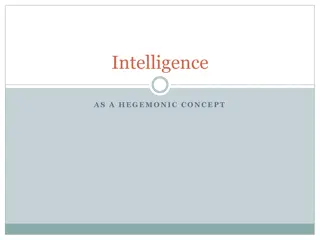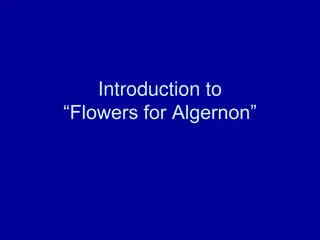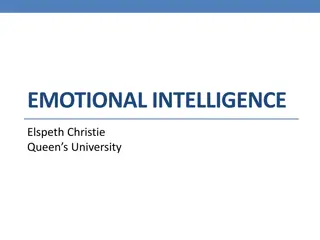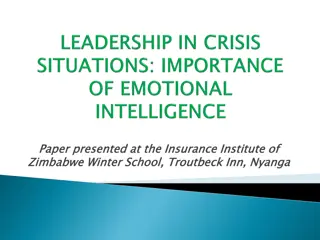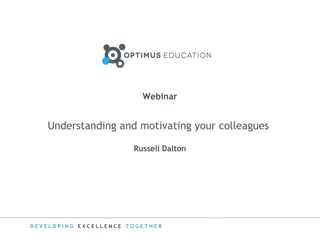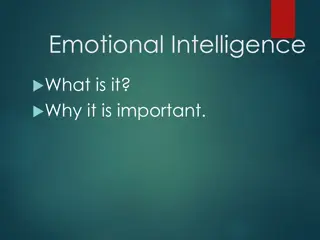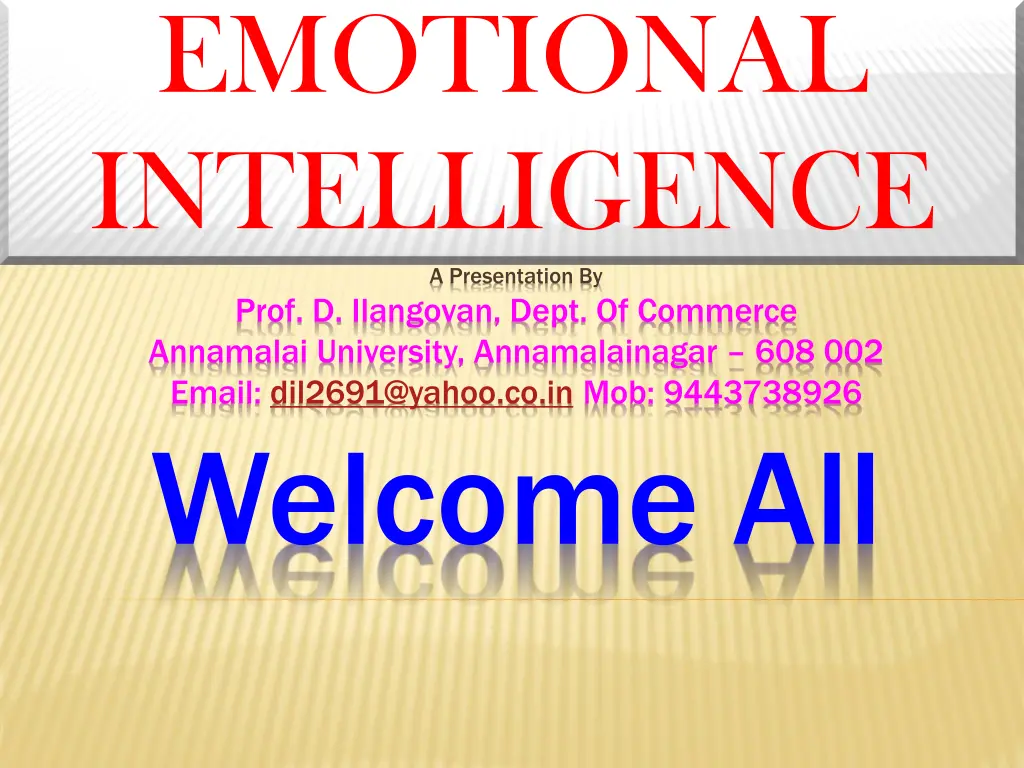
Emotional Intelligence Presentation by Prof. D. Ilangovan
Explore the dimensions of emotional intelligence with insights from Prof. D. Ilangovan at Annamalai University. Learn about wisdom, self-understanding, and the impact of emotions on EQ. Discover how emotional intelligence can positively influence stress management, communication, empathy, conflict resolution, and overall well-being in personal and professional life.
Download Presentation

Please find below an Image/Link to download the presentation.
The content on the website is provided AS IS for your information and personal use only. It may not be sold, licensed, or shared on other websites without obtaining consent from the author. If you encounter any issues during the download, it is possible that the publisher has removed the file from their server.
You are allowed to download the files provided on this website for personal or commercial use, subject to the condition that they are used lawfully. All files are the property of their respective owners.
The content on the website is provided AS IS for your information and personal use only. It may not be sold, licensed, or shared on other websites without obtaining consent from the author.
E N D
Presentation Transcript
EMOTIONAL INTELLIGENCE A Presentation By Prof. D. Ilangovan, Dept. Of Commerce Annamalai University, Annamalainagar 608 002 Email: dil2691@yahoo.co.in Mob: 9443738926 Welcome All
Prof.D.Ilangovan HD Commerce AU 23-04-2020 DIMENSIONS OF EMOTIONAL INTELLIGENCE 2
Prof.D.Ilangovan HD Commerce AU 23-04-2020 WHAT IS WISDOM? 3
Prof.D.Ilangovan HD Commerce AU 23-04-2020 THE WAY TO UNDERSTAND ONE S OWN SELF 4
Prof.D.Ilangovan HD Commerce AU 23-04-2020 5
Prof.D.Ilangovan HD Commerce AU 23-04-2020 WHAT IS YOUR WAY ? 6
Prof.D.Ilangovan HD Commerce AU 23-04-2020 7
Prof.D.Ilangovan HD Commerce AU 23-04-2020 EMOTIONS HAVE DIRECT BEARING UP ON .. EQ embraces two aspects of intelligence: Understanding yourself, your goals, intentions, responses, behaviour and all. Understanding others, and their feelings. 8
Prof.D.Ilangovan HD Commerce AU 23-04-2020 YOU GOT IT !!! Emotional intelligence (EQ) is the ability to identify, use, understand, and manage emotions in positive ways to relieve stress, communicate effectively, empathize with others, overcome challenges, and defuse conflict. Emotional intelligence impacts many different aspects of your daily life, such as the way you behave and the way you interact with others. If you have high emotional intelligence you are able to recognize your own emotional state and the emotional states of others, and engage with people in a way that draws them to you. You can use this understanding of emotions to relate better to other people, form healthier relationships, achieve greater success at work, and lead a more fulfilling life. 9
Prof.D.Ilangovan HD Commerce AU 23-04-2020 THE GOAL IS SOLUTION OF SOME KIND 10
Prof.D.Ilangovan HD Commerce AU 23-04-2020 RELATIONSHIP MANAGEMENT IS THE AIM 11
Prof.D.Ilangovan HD Commerce AU 23-04-2020 HOW DO YOU CONSTRUCT YOUR PERSONALITY ? 12
Prof.D.Ilangovan HD Commerce AU 23-04-2020 13
Prof.D.Ilangovan HD Commerce AU 23-04-2020 14
Prof.D.Ilangovan HD Commerce AU 23-04-2020 THE SKILLS REQUIRED FOR SUCCESSFUL E I Emotional intelligence (EQ) consists of five key skills, each building on the last: The ability to quickly reduce stress The ability to recognize and manage your emotions The ability to connect with others using nonverbal communication The ability to use humor and play to deal with challenges The ability to resolve conflicts positively and with confidence 15
Prof.D.Ilangovan HD Commerce AU 23-04-2020 STRESS BUSTING Realize when you re stressed Realize when you re stressed The first step to reducing stress is recognizing what stress feels like. How does your body feel when you re stressed? Are your muscles or stomach tight or sore? Are your hands clenched? Is your breath shallow? Being aware of your physical response to stress will help regulate tension when it occurs. Identify your stress response Identify your stress response Everyone reacts differently to stress. If you tend to become angry or agitated under stress, you will respond best to stress-relieving activities that quiet you down. If you tend to become depressed or withdrawn, you will respond best to stress-relieving activities that are stimulating. If you tend to freeze speeding up in some ways while slowing down in others you need stress-relieving activities that provide both comfort and stimulation. Discover the stress Discover the stress- -busting techniques that work for you busting techniques that work for you The best way to reduce stress quickly is by engaging one or more of your senses: sight, sound, smell, taste, and touch. Each person responds differently to sensory input, so you need to find things that are soothing and/or energizing to you. For example, if you re a visual person you can relieve stress by surrounding yourself with uplifting images. If you respond more to sound, you may find a wind chime, a favorite piece of music, or the sound of a water fountain helps to quickly reduce your stress levels. 16
Prof.D.Ilangovan HD Commerce AU 23-04-2020 BE AWARE OF YOUR EMOTIONS Do you experience feelings that flow, Do you experience feelings that flow, encountering one emotion after another as your experiences change from moment to moment? Are your emotions accompanied by physical sensations that Are your emotions accompanied by physical sensations that you experience you experience in places like your stomach or chest? Do you experience discrete feelings and emotions, Do you experience discrete feelings and emotions, such as anger, sadness, fear, joy, each of which is evident in subtle facial expressions? Can you experience intense feelings Can you experience intense feelings that are strong enough to capture both your attention and that of others? Do you pay attention to your emotions? Do you pay attention to your emotions? Do they factor into your decision making? 17
Prof.D.Ilangovan HD Commerce AU 23-04-2020 NON-VERBAL COMMUNICATION Focus on the other person. Focus on the other person. If you are planning what you re going to say next, daydreaming, or thinking about something else, you are almost certain to miss nonverbal cues and other subtleties in the conversation. Make eye contact. Make eye contact. Eye contact can communicate interest, maintain the flow of a conversation, and help gauge the other person s response. Pay attention to nonverbal cues Pay attention to nonverbal cues you re sending and receiving, such as facial expression, tone of voice, posture and gestures, touch, and the timing and pace of the conversation 18
Prof.D.Ilangovan HD Commerce AU 23-04-2020 19
Prof.D.Ilangovan HD Commerce AU 23-04-2020 20
Prof.D.Ilangovan HD Commerce AU 23-04-2020 21
Prof.D.Ilangovan HD Commerce AU 23-04-2020 22
Prof.D.Ilangovan HD Commerce AU 23-04-2020 ULTIMATE EFFECT OF EMOTIONAL INTELLIGENCE Your performance at work. Your performance at work. Emotional intelligence can help you navigate the social complexities of the workplace, lead and motivate others, and excel in your career. In fact, when it comes to gauging job candidates, many companies now view emotional intelligence as being as important as technical ability and require EQ testing before hiring. Your physical health. Your physical health. If you re unable to manage your stress levels, it can lead to serious health problems. Uncontrolled stress can raise blood pressure, suppress the immune system, increase the risk of heart attack and stroke, contribute to infertility, and speed up the aging process. The first step to improving emotional intelligence is to learn how to relieve stress. Your mental health. Your mental health. Uncontrolled stress can also impact your mental health, making you vulnerable to anxiety and depression. If you are unable to understand and manage your emotions, you ll also be open to mood swings, while an inability to form strong relationships can leave you feeling lonely and isolated. Your relationships. Your relationships. By understanding your emotions and how to control them, you re better able to express how you feel and understand how others are feeling. This allows you to communicate more effectively and forge stronger relationships, both at work and in your personal life. 23
Prof.D.Ilangovan HD Commerce AU 23-04-2020 THANK YOU THANK YOU MR.GOLEMAN MR.GOLEMAN FOR YOUR CONTRIBUTION FOR YOUR CONTRIBUTION 24

